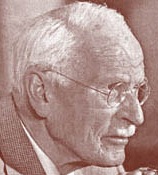|
 |
|
 |
|
|
||
Carl Jung - Psychology and Personality
Carl Jung (1875-1961)
Swiss psychiatrist (pictured right). Behind only Sigmund Freud (pictured right below) in psychiatry’s hall of fame. Famous for inventing the terms introvert and extrovert.
His most famous books are... Psychology of the Unconscious (1916) Psychological Types (1921).
What did he teach us about psychology and personality?
1. Continually seek improvement from within Your aim in life should be “individuation” (or self-fulfilment) through:
So Jung described himself as a “healer of the soul”.
2. Get closer to the real you Reveal the real you by removing your “persona”, the mask that comes from the roles you play in your work and leisure. For example, your rebelliousness may be hidden by the conformity of your job. Even if it’s painful, accept and understand your “hidden self” (the thoughts and feelings you’ve forgotten or suppressed in your unconscious) – see point 3. “We cannot change anything unless we accept it”, Jung said. 3. Conquer your demons Face up to your bad side and dark secrets (your “shadow”) with honesty, resolution and
courage. Jung's “principle of equivalence” says you should pay as much attention to your bad side as your good side.
4. Your mind (or the psyche) This does four things:
People are particularly influenced by one of these which, together with their personality type, affects their behaviour e.g. introvert or extrovert thinkers.
5. Don’t be afraid of tomorrow Accept your problems and overcome them, remembering that
Don’t be afraid of the future by
Dealing with difficulties makes you happy.
6. Love others and love yourself You need self-respect to
Love and kindness make you much happier than sex. Fear and self-hatred are the opposite of love. “I cannot love anyone if I hate myself”, Jung said. Your relationships with the opposite sex are affected by your:
7. Satisfaction from the soul Spiritual fulfilment makes you happy. This comes from:
If you believe in something (like God), you must know and experience it.
8. Motivation and continuous learning To motivate people, you must satisfy their needs for:
9. Your personality People are
10. Influence of parents Nothing has a bigger effect on children than the “unlived life of the parent” i.e. getting children to do what the parents didn’t do themselves. Parents should think more about changing themselves than imposing change on their children.
11. The power of opposites Like the Greek philosopher, Heraclitus, Jung believed that:
12. Society can be sick A society has a collective mind that is affected by its culture, ethics and science. Evil societies are shrouded in moral darkness (a “collective shadow”).
Key quotes on stress and pain The foundation of all mental health is the avoidance of true suffering. Man needs difficulties; they are necessary for health. I have never encountered a difficulty that was not truly the difficulty of myself.
Key quotes on peace of mind Your vision will become clear only when you look into your heart... Who looks outside, dreams. Who looks inside, awakens The sole purpose of human existence is to kindle a light in the darkness of mere being. Solitude for me is a fount of healing. A man who has not passed through the inferno of his passions has never overcome them.
Key quote on change
Key quotes on love I cannot love anyone if I hate myself. Where love rules, there is no will to power, and where power predominates, love is lacking.
Key quotes on success and happiness It is only our deeds that reveal who we are. We need more understanding of human nature, because the only real danger that exists is man himself. The least of things with a meaning is worth more than the greatest of things without it. Show me a sane man and I will cure him for you.
Key quote on leadership The true leader is always led.
Key quotes on God and ethics I do not believe...I know (about his belief in God). The pendulum of the mind swings between sense and nonsense, not between right and wrong. |
|
|
||
|
|
||
| Copyright © wisdomtowin.com 2025 All Rights Reserved | ||
|















